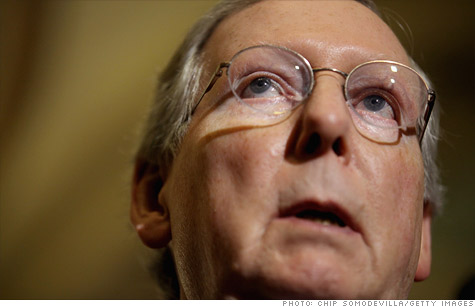Search News

The Senate GOP proposal "will provide some relief to struggling workers who continue to need it," said Senate Republican Leader Mitch McConnell.
NEW YORK (CNNMoney) -- Senate Republicans on Wednesday released the outlines of their proposal to extend the payroll tax cut -- and it differs significantly from one put out by Senate Democrats.
Republicans want to extend the Social Security payroll tax cut for one year, according to an outline released by Mitch McConnell, the top Senate Republican.
Until this week, it wasn't clear whether Republicans might back any extension despite their persistent opposition to tax increases. (Read: What's at stake in the debate)
The payroll tax break, enacted last year and scheduled to expire after Dec. 31, reduced workers' Social Security payroll tax rate to 4.2% on the first $106,800 in wages this year, instead of the normal 6.2%.
That means those making $50,000 take home an additional $1,000 this year; and those making more than $106,800 take home $2,136 more. Those savings would continue in 2012 under the GOP proposal.
What Democrats want: In contrast to the Republican plan, President Obama and Senate Democrats want to expand the cut so that workers would only pay 3.1% next year. If that were to happen, those making $50,000 would save $1,550 and those making more than $110,100 -- the new wage cap for next year -- would take home an additional $3,413.
In addition, Democrats would cut the employer's portion of the Social Security payroll tax to 3.1% on the first $5 million that the company pays in wages. And they would exempt employers from paying any Social Security tax on increases in their payroll up to a cap in the fourth quarter of this year and all of 2012.
Paying for an extension: The two parties also differ on how they would pay for the cost of the payroll tax cut.
Senate Republicans would pay for their extension -- estimated to cost close to $120 billion -- and further reduce deficits over 10 years by $111 billion, according to McConnell's outline.
The Republican proposal would institute a three-year freeze on federal civilian worker pay; reduce the size of the federal civilian workforce by 10% through attrition; prohibit millionaires from receiving unemployment benefits or food stamps; and require millionaires to pay full fare for Medicare Parts B and D.
According to the GOP, 2,360 tax filers with adjusted gross incomes over $1 million received a total of $20.8 million in unemployment benefits in 2009.
The Republican plan also includes a proposal from Sen. John Thune that invites millionaires and billionaires, such as Warren Buffett, who feel they aren't taxed enough to voluntarily pay more to reduce federal deficits.
To assist in the effort, a new line on the federal income tax return would be created for such voluntary donations. Republicans say the change would reduce deficits by $124 million over 10 years.
Obama and Senate Democrats have proposed to pay for their expanded payroll tax cut -- estimated to cost roughly $265 billion -- by imposing a surtax on millionaires.
Republicans have made it clear a millionaire surtax is a non-starter.
The Senate GOP proposal "will provide some relief to struggling workers who continue to need it but without raising taxes on job creators, which is what the Democrats' proposal would do," McConnell said in a statement.
On Wednesday Senate Majority Leader Harry Reid issued a statement saying the Republican proposal cannot pass the Senate in its current form.
"[N]ow that Republicans have reversed their position on this middle-class tax cut, we look forward to working with them to negotiate a consensus solution," Reid said. ![]()
| Overnight Avg Rate | Latest | Change | Last Week |
|---|---|---|---|
| 30 yr fixed | 3.80% | 3.88% | |
| 15 yr fixed | 3.20% | 3.23% | |
| 5/1 ARM | 3.84% | 3.88% | |
| 30 yr refi | 3.82% | 3.93% | |
| 15 yr refi | 3.20% | 3.23% |
Today's featured rates:
| Latest Report | Next Update |
|---|---|
| Home prices | Aug 28 |
| Consumer confidence | Aug 28 |
| GDP | Aug 29 |
| Manufacturing (ISM) | Sept 4 |
| Jobs | Sept 7 |
| Inflation (CPI) | Sept 14 |
| Retail sales | Sept 14 |